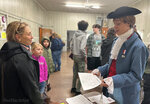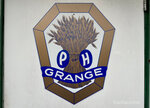








George Washington recently spoke at South Union Grange. Who better to lead a celebration of the 250th anniversary (1773-2023) of the Boston Tea Party than the “father” of his country? And what better city as a venue than Olympia, the capital of the only state named for a U.S. president?
On Friday, April 21, 2023, Beverly York and friends celebrated the 250th anniversary of the Boston Tea Party with a public event. It was held in Tumwater's South Union Grange #860 and attracted 145 people, primarily families with children. They enjoyed berry/fruit tea; froggers, a colonial ginger/molasses cookie; sugar biscuits with nutmeg; and several activities.
General George Washington (Vernon Frykholm) spoke about the Boston Tea Party and also about the general's garden (he had four). The Grange is an association that advocates for agriculture and rural America and so the gardens were an apt topic for the venue.
The Boston Tea Party was a protest against high taxation by the British government. Following are three facts about the Boston Tea Party:
As a farmer, General Washington worked constantly to develop better agricultural practices. George was one of our nation’s first "Master Gardeners." Apart from his military and political career, George Washington was considered one of the most innovative farmers of his time.
Here are some of his most important agricultural achievements:
Washington's agricultural achievements helped to establish the U.S. as a major agricultural power. His innovative farming techniques and commitment to sustainable agriculture continue to influence farmers and researchers today.
Before, after and between the two lectures, children and adults participated in various activities: weaving small baskets, sewing 4-patch quilts, playing games, cursive, and coloring.
Connie Barclay taught basket weaving for industrious visitors to weave a small basket to take home.
Quilter and Grange member Diane Williams helped attendees sew their own four-patch quilt with batting and backing.
Alice Swidecki led a “Spencer Cursive” mini-workshop, with parchment of the Declaration of Independence as a backdrop. Spencerian penmanship, based on Copperplate script, was developed in New York in 1840 by Platt Rogers Spencer. It was, in part, a rebellion against the cramped British script, uniquely American, and became the standard for handwriting in the U.S. It remained popular until the early 1900s when the more basic Palmer method gained favor.
Sherry Stacy read, "If You Lived in Colonial Times," a children's book. Sherry is a published author and retired teacher. She has been a leader in the homeschool community for decades.
Well-known as a Northwest reenactor, Vern has portrayed George Washington since 2012, giving over 500 portrayals to more than 25,000 people.
He has talked to students at schools, clubs, libraries, business groups, churches, and regional/national conferences. He appeared at the George Washington Inn, between Sequim and Port Angeles for the annual Lavender Festival in for 10 years and the annual Northwest Colonial Festival for 7 years. During the Covid-19 crisis, he responded by Zooming into classrooms and meetings. He also developed educational videos online. His website, http://georgewashingtonspeaks.com, YouTube channel, and Facebook page offer more than 80 educational videos.
York invited each person and family at the event to pose for a photo with the "real" George Washington and it proved to be a popular activity!
Beverly York holds the office of Lecturer at the South Union Grange. This event was a joint venture of the South Union Grange #860, Daughters of the American Colonists, and Daughters of the American Revolution.
Shirley Stirling, of Lacey, writes about good things people in Thurston County are doing. If you’d like to nominate someone to be profiled, contact her at shirley@theJOLTnews.com or comment below.
4 comments on this item Please log in to comment by clicking here
JulesJames
Many colonial ports hosted tea party protests like Boston’s. Such behavior would have been completely abhorrent to Col. Washington in 1773. Mr. Frykholm’s interpretation of events would be interesting.
Friday, May 5, 2023 Report this
Jtaylor
Um...so you're just going to ignore the slaves that actually did George's farming? Farming is pretty easy when you don't have to do any of the work yourself nor pay anyone to do the work for you. Complete drivel.
Saturday, May 6, 2023 Report this
Shirley - another great article on the happenings in our community in educating people about our history, especially during Colonial times.
Saturday, May 6, 2023 Report this
Hmoats
I hope the talk included sufficient information on the hundreds of people George Washington enslaved to tend those "gardens". https://www.mountvernon.org/george-washington/slavery/field-labor/
Monday, May 8, 2023 Report this